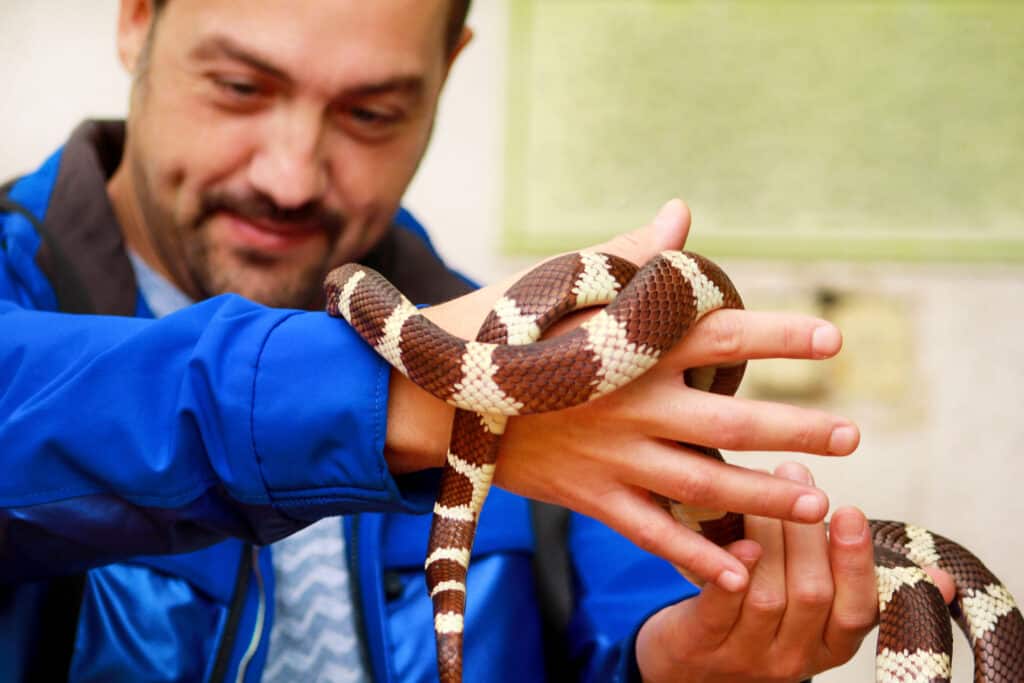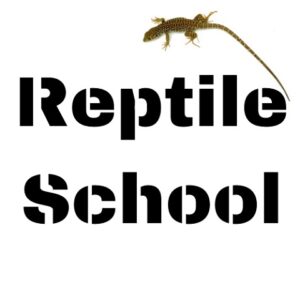
There are many different types of exotic pets to choose from, and snakes like the California Kingsnake have become some of the most popular for pet owners. If you are new to exotic pet ownership, you may not be familiar with the types of snakes that are best for first-time owners. Even if you are a veteran snake owner, it’s essential to know the type of temperament each species exhibits.
California Kingsnakes are known to be one of the most docile and friendly snake species. While they do tend to bite when they are nervous or smell prey, they are nonvenomous and do not have fangs. Because of their easily tamed nature, many pet stores recommend them to first-time snake owners.
Each species of snake has its pros and cons when it comes to pet ownership. For California Kingsnakes, the number of pros tends to outweigh the cons. They live long lives, up to 20 years, and become more comfortable with you the longer they are with you. Keep reading to learn more about why California Kingsnakes are considered friendly.
Are California Kingsnakes Friendly?
California Kingsnakes are considered one of the more friendly species of snakes. They are easy to care for, live long lives, and have beautiful colors that make them attractive to pet owners. Though they can be aggressive when it comes to other snakes, including their own species, they are typically calm and passive with humans when handled and cared for appropriately.
It may take a little while for your snake to get used to you. Give them time to settle into their new home and make sure they have space to hide and relax away from all of the stimulation. If you approach them calmly and caringly, they will reciprocate that gentleness to you. They need to learn that you are a trusting, caring handler, and they will remember that about you.
Do California Kingsnakes Bite?
Yes, California Kingsnakes do bite. They are known as one of the nippier species of pet snakes because of their sometimes-anxious response to being handled. Especially after you first get them, they may be untrusting and more prone to bite out of fear.
It’s important to note that California Kingsnakes don’t bite from aggression. They will only bite if they feel threatened or if you happen to smell like prey. They do not have fangs, and their teeth are tiny, so their bites typically don’t break the skin. If they do break the skin, it’s usually a small puncture or scratch that can easily be cared for with good handwashing, sanitation, and a small bandage.
California Kingsnakes are nonvenomous, so their bites don’t pose a threat other than the initial minor pain associated with it. In the wild, they constrict their prey to kill it, so their teeth are not their primary hunting tool. Once you understand how to handle a California Kingsnake properly, they become more comfortable with you and are much less likely to bite.
What to Do If You Are Bitten By a California Kingsnake
If a California Kingsnake bites you, try your best to stay calm. The more you panic, the likelier it will be for them to bite harder. Try to relax and allow them to open their bite. They will stop biting if they feel less threatened. Once they have let go, place them gently back in the enclosure and give them some space for a while. Make that you properly wash and sanitize the area that you were bitten.
How to Handle a California Kingsnake
It’s important to know how to best handle a California Kingsnake to keep both you and the pet safe. When you first get the snake, you’ll need to handle it regularly, so it gets used to your scent and touch. It will likely see you as a threat initially, so go slow and for smaller amounts of time at first.
There are some key things to know when handling the California Kingsnake:
- Don’t handle right before, after, or during shedding. Snakes tend to feel more vulnerable and aggressive during their shedding process. Leave them alone until it is finished.
- Don’t handle right before, during, or within 12 hours after feeding. Feeding time is also vulnerable to them. If you handle them too soon after feeding, they can become defensive and regurgitate their food.
- Don’t touch the top of their heads. Many snakes don’t appreciate their head being touched and may jerk quickly away, which might scare you. Avoid their heads until they are sufficiently comfortable with you.
- Handle your snake with open hands. You don’t want to grip or squeeze your Kingsnake. If it feels restricted, it can become afraid and might try to defend itself by biting you.
- Make sure to wash your hands before handling them. Kingsnakes are particularly sensitive to scent and can mistake you easily for some of their prey. You want to remove all traces of scent from your hands, especially if you have other pets that you have handled.
Keep in mind the perspective from the snake’s point of view. If you allow yourself to think as they think, you’ll be better at understanding their mannerisms and anticipating their needs while handling them.
Signs That Your California Kingsnake Is Upset
There are some tell-tale signs that California Kingsnakes give to show that they are upset. It’s good to familiarize yourself with these so you can understand when to leave them alone or be gentler with them.
- Shaking its tail like a rattlesnake: While it poses no actual threat, the Kingsnake will sometimes shake its tail to let you (or the predator) know to back away.
- Curling up: If the snake is trying to curl up into a ball, leave it alone. It’s likely frightened and feeling anxious.
- Expelling Feces: Just like many other types of animals, snakes may defecate to ward off potential threats.
- Excreting Musk: Serving the same purpose as feces, musk is a foul-smelling substance that snakes can excrete from the cloaca if feeling threatened.
- Biting: If a Kingsnake bites, it’s an obvious sign that it is upset. Gently put it back in its enclosure and leave it alone to relax.
Learn to watch your Kingsnake for any defensive postures or mannerisms. They may retreat to a favorite spot in the enclosure where they would prefer not to be handled. If you notice any of their defensive behaviors, don’t try to coerce them out of it. This will likely just cause them to become more anxious and fearful.
Are California Kingsnakes Good for Children?
Because Kingsnakes are nippy, they might not be the best choice for children. That being said, a Kingsnake can be a successful family pet if cared for under adult supervision.
While the California Kingsnake temperament is considered docile and friendly, it’s crucial that you never leave them alone with small children. Small children may be too unpredictable for the snake and could be bitten if the child handles the snake inappropriately.
Older children may have success with Kingsnakes, but you’ll need to closely supervise them with all feedings, handlings, and care until you are sure that your child understands how to treat the snake. Teach them what to do if the snake becomes defensive or bites so they know how to keep themselves and the snake safe.
The best option for a first-time snake owner would probably be a corn snake. They have many of the same qualities as the kingsnake but are not as likely to bite.
Conclusion
California Kingsnakes are an excellent option for new and seasoned exotic pet owners. The California kingsnake temperament is relatively easygoing for a pet reptile. They are friendly, docile, and have a long lifespan. While they can sometimes bite if they feel threatened, they are not aggressive. They’ll let you know if they feel upset or defensive, so pay attention to these cues.
Kingsnakes trust their owners the more they are handled as long as the handling is done appropriately. They should never be squeezed or forced, or they will feel anxious. Use caution when kingsnakes are around children. Don’t leave them alone with small children, and make sure older children know how to care for them appropriately.
For a full guide check out our California Kingsnake Care Sheet Here!
